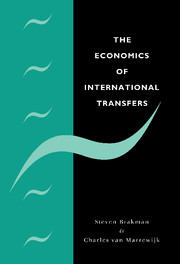Book contents
- Frontmatter
- Contents
- List of figures
- List of tables
- Preface
- 1 General overview and stylized facts
- 2 The Keynes–Ohlin controversy
- 3 Welfare effects: Samuelson's theorem
- 4 Generalizations of Samuelson's theorem
- 5 Clouds on the horizon 1: distortions
- 6 Clouds on the horizon 2: third parties
- 7 The economics of multilateral transfers
- 8 The consequences of tied aid
- 9 Imperfect competition
- 10 Dynamics, money and the balance of payments
- Mathematical appendix
- References
- Index
6 - Clouds on the horizon 2: third parties
Published online by Cambridge University Press: 07 January 2010
- Frontmatter
- Contents
- List of figures
- List of tables
- Preface
- 1 General overview and stylized facts
- 2 The Keynes–Ohlin controversy
- 3 Welfare effects: Samuelson's theorem
- 4 Generalizations of Samuelson's theorem
- 5 Clouds on the horizon 1: distortions
- 6 Clouds on the horizon 2: third parties
- 7 The economics of multilateral transfers
- 8 The consequences of tied aid
- 9 Imperfect competition
- 10 Dynamics, money and the balance of payments
- Mathematical appendix
- References
- Index
Summary
From two to three: a trivial extension?
The analysis in chapters 3 and 4 investigated international transfers from one country to another in a two-country world. There is a donor and a recipient, but there are no other countries. Are these other countries, which do not participate in the transfer, of any importance to the results derived in chapters 3 and 4? One might think not, and in one respect this assertion is true. In his analysis, Pigou (1932), following up on the Keynes–Ohlin controversy, treats all countries which neither pay nor receive payments as though they were part of the receiving country. This procedure is criticized by Elliot (1938), who goes on to argue that it is equally inappropriate to treat the non-participating countries as though they were part of the paying country; instead, they should be treated separately. After some verbal argumentation, building on Pigou's (1932) analysis and concentrating on the terms-of-trade effect, Elliot concludes, however: “It follows from these cases that the introduction of a neutral country does not alter the probability that a series of unilateral payments will tend to turn the terms of trade against the paying as compared with the receiving country.” (p. 489)
As we shall see later in this chapter, Elliot's conclusion that the presence of non-participating countries has no effect on the direction of the terms-of-trade effect of a transfer is correct. Unfortunately, following this conclusion, and despite many analyses of different aspects of the transfer problem by leading economic experts, it seems as if it was implicitly assumed that the presence of non-participating countries has no influence on the welfare effects of the transfer either.
- Type
- Chapter
- Information
- The Economics of International Transfers , pp. 96 - 118Publisher: Cambridge University PressPrint publication year: 1998



